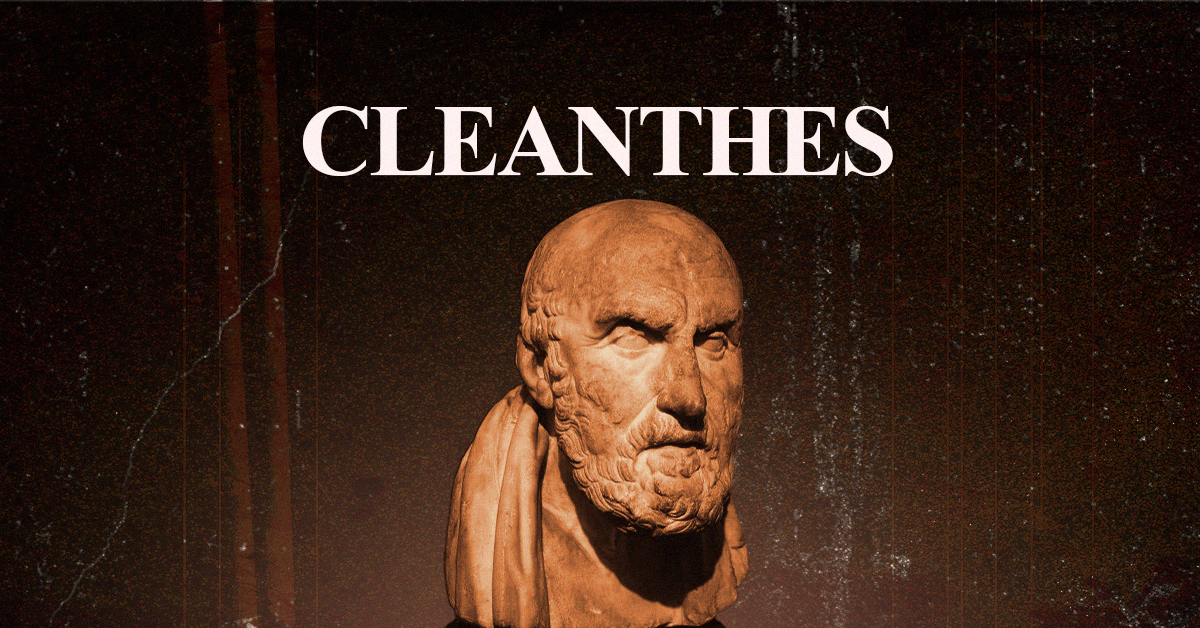
Zeno of Citium had many notable students, one of which went on to succeed him as the head of the Stoic school in Athens. This pupil, Cleanthes, was originally a boxer that took up philosophy after arriving in Athens and hearing the lectures of Zeno. Though only fragments of his writings have been passed down to modern times, there are a handful of Cleanthes quotes that we still have access to, thanks in large part to writers such as Seneca, Cicero, Stobaeus, Diogenes Laertius, and Plutarch.
After spending many years studying philosophy by day and supporting himself as a water carrier by night, Cleanthes went on to hold the post of scholarch at the Stoic school for three decades. Not only did he preserve and develop the ideas of Zeno, the founder of Stoic philosophy, but he also originated new ideas in the realm of Stoic physics. Even once he had taken up the esteemed position at the school, he is said to have continued carrying water at night.
In what we know of Cleanthes’ life, you can see the core ideas of Stoicism put into practice. It is believed that he took over leadership of the Stoic school thanks to the high moral qualities he displayed in his day-to-day life, which earned him high esteem in the community. He was known as a man that lived simply, worked diligently, and embodied the quality of patient endurance.
What are the best quotes from the Stoic philosopher Cleanthes? What wisdom can we gain from them today? Let's dive in and take a look.
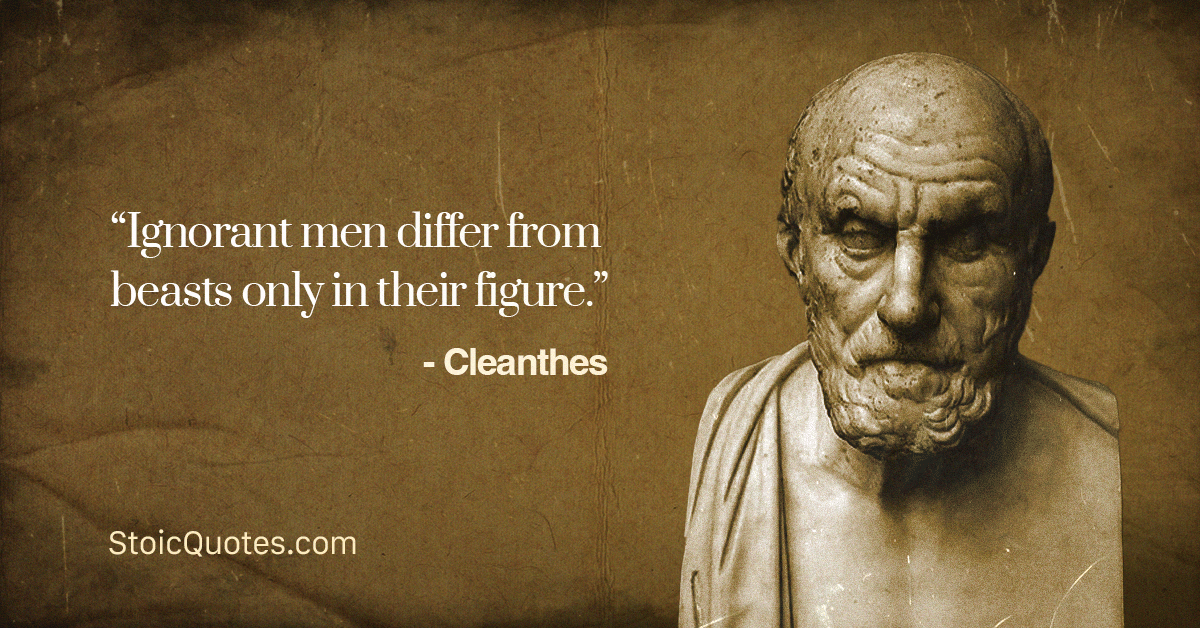
Though we only have a few pieces of Cleanthes' writings, we are able to glance at his perspective on ignorance and how it might have informed the thoughts of future Stoics.
In the Stoic view of the world, man can find happiness in living a virtuous life in accordance with nature. However, if a man is ignorant of what virtue is and what vice is (or the importance of living virtuously,) then he will fall short of the desired eudaimonia (normally translated as good spirit, happiness, or welfare.)
An important tenet of Stoicism is seeking the truth and being honest with oneself. There are countless ways we can deceive ourselves, but doing so will only be harmful in the long run. Marcus Aurelius said so himself when he wrote that “no one was ever injured by the truth, but he who persists in self-deception and ignorance are injured.”
In the following quotes, we can see how the early Stoics, as taught by Zeno of Citium, viewed the concept of ignorance. When we are ignorant, willingly or otherwise, we aren’t acting in accord with nature and the force that creates order in the universe: reason.
“Ignorant men differ from beasts only in their figure.” - Cleanthes
While the beliefs of the most famous Stoics are not entirely identical, a shared thread among the great Stoic philosophers was that the capacity to reason is common to all people. It is thanks to this idea that a universal moral law is implied, which all humans have the capacity to appreciate.
In this quote, Cleanthes points to the notion that the primary factor that distinguishes man from animals is their capacity to think and reason. He implies here that when men are ignorant rather than rational, the only remaining thing that separates them from beasts is their physical form.
The Stoics put forward the idea that humans can be happy by living in rhythm with nature, which is guided by reason and universal moral law. However, when men choose to ignore this reality (i.e. are ignorant,) they are left to live a life more like that of an animal than a human.
“But bountiful Zeus, shrouded in dark clouds and ruling the thunder,
Protect human beings from their ruinous ignorance;
Scatter it from our souls, grant that we might obtain
True judgment on which you rely to steer all things with justice;
So that having won honor, we may honor you in return,
Constantly singing of your works, as it is proper
For mortals to do. For neither mortals nor gods have any greater privilege
Than to make everlasting song of the universal law in justice.” - Cleanthes
In understanding the thoughts and works of Cleanthes, the largest surviving fragment of his writing comes in the form of a portion of the Hymn to Zeus. This piece of writing was preserved by Stobaeus, who lived in the 5th-century AD and compiled a number of valuable extracts from Greek writers.
It is from this poem that we have the privilege of engaging with another quote from Cleanthes on the potential for ignorance among humans.
Here he asks Zeus, whom he earlier calls “the prime mover of nature,” to help humans steer clear of their ignorance in favor of reason. If humans can “obtain true judgment,” they can win honor and honor the prime mover of nature in return.
You can see here how central the notion of reason, justice, and universal law are to the earliest Stoic thinkers. According to Cleanthes, not only should humans aim to be free of ignorance and live a life led by reason, but should understand that living such a life is a way of honoring the gods, Nature, and the universe.
“Not a single thing that is done on earth happens without you, God,
Nor in the divine heavenly sphere nor in the sea,
Except for what bad people do in their foolishness.” -Cleanthes
In this quote, we get a greater understanding of how Cleanthes views the relationship between fate and free will. Here, he speaks directly to Zeus, expressing that all of the things that occur on earth and beyond are his works. That is, except the ignorant acts of man that run contrary to universal law.
The idea put forward here is that, by living consistently with nature, an individual is playing out occurrences that have already been decided by fate and the universe. It is only those that choose to run contrary to nature that is fulfilling acts that were not facilitated by the gods.
While this all might feel a bit old-school and impractical for the modern-day, there is much wisdom to be found here.
If you look at your experiences so far in life, there are likely times when you felt you were more or less successful in living rationally and in accordance with nature. It can be a useful tool to review your life in this way, considering some of the notable occurrences and how you responded. While it can be painful to reflect on times when your actions could best be described as “what bad people do in their foolishness,” it is only through honest self-reflection and self-awareness that we can achieve a life that is more in rhythm with nature and the universe.
Whatever your opinions are on the God question, if you are seriously interested in applying Stoicism to your life you cannot fully do so without incorporating a belief in a larger order to things. If you find value in many Stoic ideas, think about what it might mean for there to be a divine force that is constantly in motion. From there, you can consider whether your actions run in tandem with that force or if your actions are more like wrenches being thrown into the gears of a divine machine.
“People walk in wickedness all their lives or, at any rate, for the greater part of it. If they ever attain to virtue, it is late and at the very sunset of their days.”
This is one of those passages that helps one realize that the ancient Greeks weren’t much different than ourselves. Most of us know someone who went through life at odds with everyone around them and the universe itself, only to develop a desire to live virtuously as they grow closer to death.
As modern people interested in Stoicism, it is our task to not assign this fate to ourselves. Instead, we can work to understand what a virtuous life consists of and start living that way now, not decades down the road.
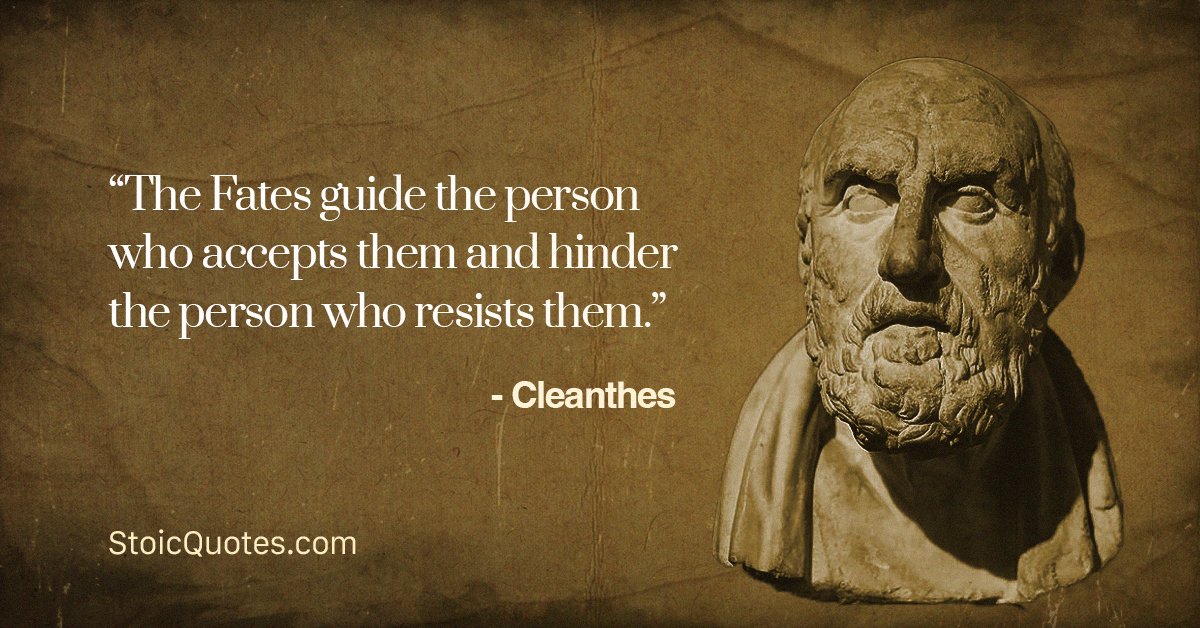
According to the Pew Research Center, 44% of American adults say they believe in fate.
When you break things down further into more specific demographic groups, you find that some groups are much more likely to claim they believe in fate than others. For example, the percentage of people without college degrees that belief in fate is 49%, while only 32% of people with college degrees say they believe the course of their life is predetermined. Women are also more likely to believe in fate than men, and religiously affiliated Americans are also more likely to believe in fate. Out of Americans that aren’t affiliated with any particular religion, only one-third believe in fate.
To the Stoics, though, fate was a central aspect of their worldview. You can find many different definitions of fate according to the Stoics, including:
When Cleanthes speaks of fate, though, you can’t help but notice that he seems to ascribe some fairly human qualities to the force. He speaks of “the Fates” and their ability to lead or drag us to our destiny. It’s easy to try and water down Stoicism to fit our modern worldview, but it's worth noting that the ancient Greeks had a complex system of gods and goddesses, three of whom were responsible for determining the destinies of humans.
A question that often pops up in forums focused on modern Stoicism is how a belief in fates can coincide with guiding one’s life by reason. In the following two sections, we’ll allow Cleanthes to offer his perspective on fate, reason, and how these two forces apply to our experience in life.
"The Fates guide the person who accepts them and hinder the person who resists them." - Cleanthes
One of the major ideas of Stoicism, which is particularly fleshed out in the quotes of Epictetus, is that there are only a few things in life that you are in control of, including your “opinion, motivation, desire, aversion, and, in a word, whatever is of our own doing.” Most other aspects of our lives are out of our control, such as “our body, our property, reputation, office, and, in a word, whatever is not of our own doing.”
Stoicism has, in part, regained popularity in modern times because of ideas such as this one. When we understand what we are in control of and what we aren’t in control of, we can focus our energy in directions where we can expect to actually receive results. In this way, we have more power to create the lives we want to live.
Also entwined with these ideas, though, are the ideas of fate or “the Fates.” These forces are something we are inherently not in control of. No matter what we do, we don’t get to choose what fate has in store for us.
However, Cleanthes here puts forward an idea that we, as individuals, can either work with Fate or against it. He argues that if we accept fate and its influence over our lives, fate itself will help point us in the right direction. On the other hand, though, if we are resistant to fate and try to go against the natural unfolding of events as fate would have it, we will run into countless obstacles along the way.
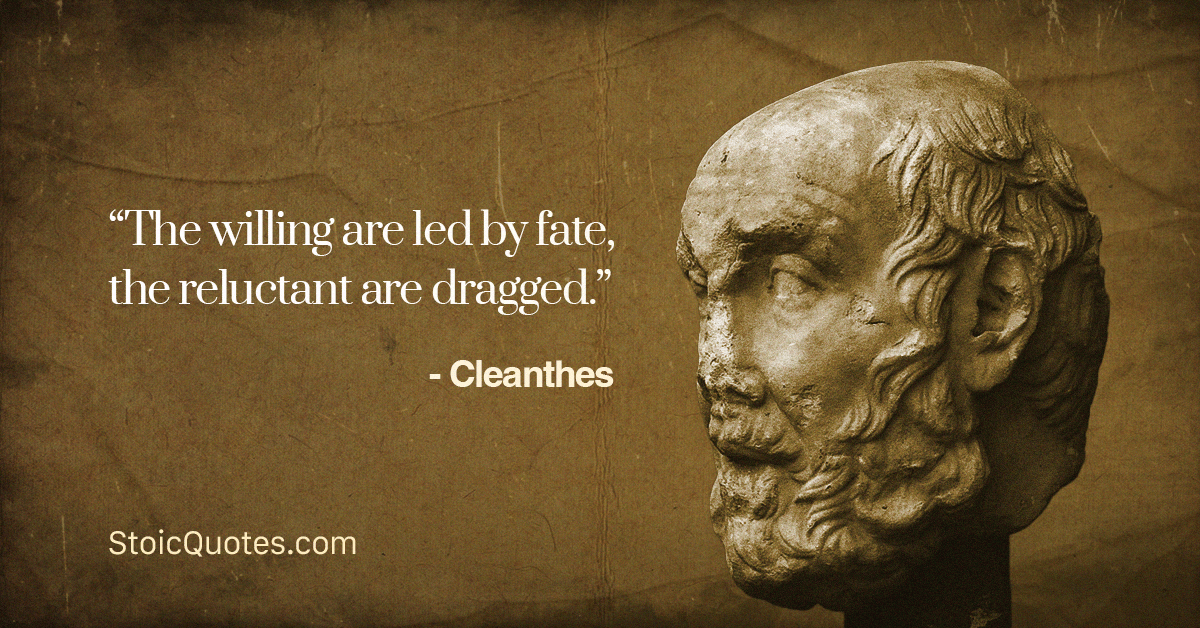
"The willing are led by fate, the reluctant are dragged." - Cleanthes
This quote reflects a very similar idea to the quote above. He is speaking of the reality that people can either accept the role of fate in our lives or they can be hesitant to do so.
The point put forward here, though, is that you can either go along with fate in a graceful way or you can do so in a graceless way. Being resistant to fate won’t change the fact that it can impact the outcomes of your life. The only thing that being reluctant to accept the role of fate does is make your life more chaotic and clunky as it brings you where you are going one way or the other.
There is also a question of your attitude and how that impacts the type of life you lead implied in this quote. Are you a willing participant in the complex machine of the universe, or are you reluctant to understand that not everything is in your control? Cleanthes argues that those that accept the task of life willingly will be led, while those who have a bad attitude about the whole thing will experience a much less elegant stroll down the path of fate.

"Lead me, Zeus, and you, Fate, wherever you have assigned me. I shall follow without hesitation; but even if I am disobedient and do not wish to, I shall follow no less surely." - Cleanthes
This beautiful fragment from Cleanthes’ hymn to Zeus helps to display his worldview and his understanding of the role of the divine in the lives of humans. He sees his life as something that has been assigned to him by the gods and Fate, and he sees his job as following the universal order without resistance.
He also points to his own free will in relation to fate, though. In saying that it is possible that he will be “disobedient” and won’t wish to follow, he is indicating the fact that each man chooses whether or not he goes along with fate willingly.
In the last phrase of this quote, we point upon something that is often left out of the discussion of modern Stoicism. While you can find countless articles online about Stoic philosophy and reason, a less popular notion is the one of faith. In his statement that he “shall follow no less surely,” he indicates that faith in the gods, Fate, and an ordered universe are a necessary part of his worldview.
Now that we have looked at Cleanthes’ writings on fate, let's see what he has to say about reason. These two quotes are pieces of his Hymn to Zeus and focus on the notion that the universe is guided by reason through the hands of a divine force.
“So, I shall make song of you constantly and sing forever of your might.
Truly, this whole universe, spinning around the earth,
Obeys you wherever you lead, and willingly submits to your rule;
Such is the servant you hold in your unconquerable hands,
A double-edged, fiery, ever-living thunderbolt.
For by its strikes all the works of nature happen.
By it you direct the universal reason, which pervades all things
Intermixing with the great and small lights of the heavens.” - Cleanthes
Here Cleanthes speaks directly to Zeus, stating that it is he that determines what happens here on earth. In his eyes, it is this divine force that directs the universal reason that guides everything that happens.
“But you know how to make the crooked straight
And to bring order to the disorderly; even the unloved is loved by you.
For you have so joined all things into one, the good and the bad,
That they all share in a single unified everlasting reason.”- Cleanthes
Again, Cleanthes points out that the universe is guided by reason, but at the hands of Zeus. That all things in existence are connected in this universal reason, and that through it order is created. We see here just how interconnected reason and fate are in the worldview of Cleanthes. While we might struggle to see how these two ideas aren’t contradictory in the modern world, Cleanthes presents a mindset through which reason and fate exist in perfect harmony.
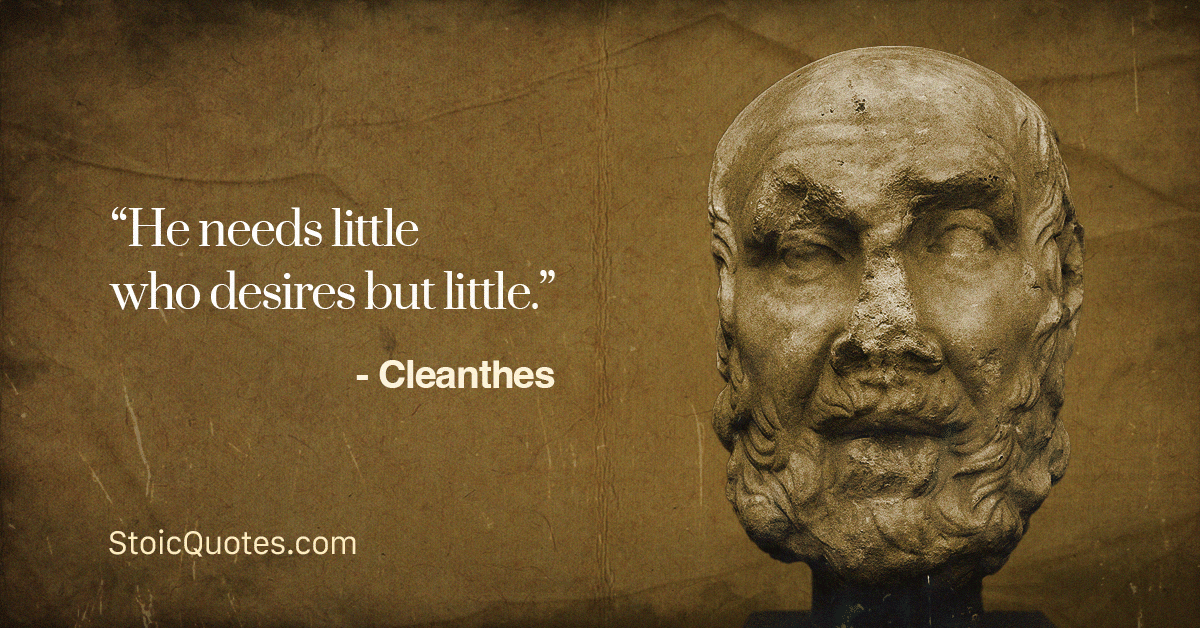
When Cleanthes showed up in Athens, he only had four drachmae in his possession despite having been a successful boxer early in his life. He went on to live a simple life even though he became the scholarch of the Stoic school in Athens, carrying water at night and engaging with philosophy during the day.
In the face of a chaotic economic environment, it’s easy for us to put nearly all of our energy on how to make money, how to save money, and how to not get left behind. While there’s nothing wrong with being responsible with money, sometimes we can confuse the necessity of having what we need with a desire to have as much as possible.
Through the words of Cleanthes, we remember that the Stoics believed we can control the way we react to the world and not much else. We can apply this to the world of wealth and material possessions, recognizing that if we choose to believe that we have enough, then we will have everything that we need.
"He needs little who desires but little." - Cleanthes
This is a sentiment that shows up in the writings of many great Stoic thinkers. Epictetus echoed this idea when he said that “wealth consists not in having great possessions, but in having few wants.”
Our culture often equates success with wealth and material possessions. At the same time, though, it’s common knowledge that money can’t buy happiness. Even though this phrase is so often repeated that it’s basically a cliche, many of us have a hard time taking it seriously.
In this Cleanthes quote, he kind of flips this notion on its head. Rather than focusing on the fact that money won’t necessarily make your life enjoyable, he points to the fact that your attitude dictates just how much you actually need from this life.
If you can cultivate a sincere relationship with life where you do not need much, then you simply won’t need very much. If you want to live a minimalistic life, you can certainly get rid of all of your superfluous possessions and see how you do. However, you’ll likely find that you start accumulating stuff all over again unless you create a genuine belief within yourself that you don’t desire to have more than you have.
“He has his wish, whose wish can be to have what is enough.” Cleanthes
Very similar to the ideas in the above quote, Cleanthes again focuses on the importance of one’s mindset. An aspect of being able to practice gratitude in this life is recognizing all of the things that we have rather than focusing on the things we don’t have. What if you could transform your outlook on your life and cultivate a sense of what is enough? What if, through doing so, you realize that your wish of having enough has already been granted?
There is something tremendously freeing about this perspective. After all, so many of us are taught to focus all of our energy on accumulating wealth for some future where we could theoretically enjoy it.
This all isn’t to say that you should sell all of your possessions, quit your job, and build yourself a lean-to in the closest patch of forest. However, it does point to the importance of your attitude and your headspace when it comes to interpreting your own life. It might just be possible that acceptance of your circumstance and happiness in life isn’t decades away, but instead, just an attitude shift away.
“The wretched, whoever long for the getting of good things,
Neither see nor hear God’s universal law,
By which, obeying with understanding, they could share in the good life.
But instead they chase after this and that, far from the good,
Some in their aggressive zeal for fame,
Others with a disordered obsession with profits,
Still others in indulgence and the pleasurable exertions of the body.
[They desire the good] but are carried off here and there,
All the while in zealous pursuit of completely different outcomes.” -Cleanthes
Cleanthes had fairly strict views on the world of pleasure and passion. He thought that pleasure was both “worthless” and “contrary to nature.” The passions, such as fear, love, and grief, were seen by him as weaknesses that made it difficult or impossible for humans to strengthen both their body and their soul.
He speaks here of people who are solely focused on consuming and accumulating material possessions and how they are blind to the universal law of reason. Quite bluntly, he goes on to explain that these people could actually enjoy a good life if they could only “hear God’s universal law.”
These people are always chasing things that Cleanthes believes are contrary to living in accordance with nature, whether it be fame, money, or hedonistic pleasure. He remarks, almost with some sadness, about the fact that these people are after what they think is good, but they’re totally missing the mark.
You probably don’t have to look very far to see people who fit the bill in this regard. If you’re being honest, you might even see this in yourself in some ways.
If you feel a bit personally attacked, never fear. Our culture is largely built around the desire for wealth, fame, and hedonistic indulgences. However, we have the ability as individuals to stop chasing after these things that will never actually give us the good life, and shift our attention to living virtuously whenever we please.
As only the second head of the Stoic School in Athens, the ideas of Cleanthes help us to get a greater understanding of the origin of this philosophy. Not only was Cleanthes the pupil of Zeno of Citium, Stoicism’s founder, but he also taught one of the most important Stoic thinkers, Chrysippus.
It is truly unfortunate that we don’t have more of Cleanthes' writings to help us gain a better understanding of his philosophy. However, we are lucky to have the works that we do, thanks to Greek and Roman writers that came after him. After engaging with the works of Cleanthes, it’s hard not to wonder whether it is fate itself that created the outcome where we only have pieces of his works.
All this being said, how can you apply Cleanthes’ ideas to your life?
While we aren’t presented with a cohesive worldview through the fragments of Cleanthes’ writings that survive to the modern-day, they help to flesh out the ideas of the early Stoics. If you have always felt resistant to the idea of fate, perhaps you can reflect on your own life and consider whether there are any moments that fell into place so precisely that it seems unreasonable to assume it was just a coincidence.
Or, on the other hand, you can consider events that seemed to be terrible when they occurred, but ultimately helped you grow or worked out for the best in the end.
If we try to live virtuously while recognizing that there are forces acting on our lives that are out of our control, we might just find that we exist in the state of eudaimonia that everyone is after.
Are you looking for more inspiring quotes by the greatest Stoic thinkers of all time? If so, be sure to check out the ever-growing library at StoicQuotes.com.
We encourage you to share this article on Twitter and Facebook. Just click those two links - you'll see why.
It's important to share the news to spread the truth. Most people won't.